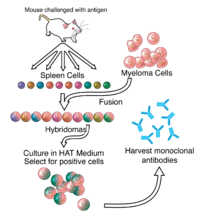
Photo from wikipedia
ORF3a has been identified as a viroporin of SARS-CoV-2 and is known to be involved in various pathophysiological activities including disturbance of cellular calcium homeostasis, inflammasome activation, apoptosis induction and… Click to show full abstract
ORF3a has been identified as a viroporin of SARS-CoV-2 and is known to be involved in various pathophysiological activities including disturbance of cellular calcium homeostasis, inflammasome activation, apoptosis induction and disruption of autophagy. ORF3a-targeting antibodies may specifically and favorably modulate these viroporin-dependent pathological activities. However, suitable viroporin-targeting antibodies are difficult to generate because of the well-recognized technical challenge associated with isolating antibodies to complex transmembrane proteins. Here we exploited a naïve human single chain antibody phage display library, to isolate binders against carefully chosen ORF3a recombinant epitopes located towards the extracellular N terminal and cytosolic C terminal domains of the protein using peptide antigens. These binders were subjected to further characterization using enzyme-linked immunosorbent assays and surface plasmon resonance analysis to assess their binding affinities to the target epitopes. Binding to full-length ORF3a protein was evaluated by western blot and fluorescent microscopy using ORF3a transfected cells and SARS-CoV-2 infected cells. Co-localization analysis was also performed to evaluate the “pairing potential” of the selected binders as possible alternative diagnostic or prognostic biomarkers for COVID-19 infections. Both ORF3a N and C termini, epitope-specific monoclonal antibodies were identified in our study. Whilst the linear nature of peptides might not always represent their native conformations in the context of full protein, with carefully designed selection protocols, we have been successful in isolating anti-ORF3a binders capable of recognising regions of the transmembrane protein that are exposed either on the “inside” or “outside” of the infected cell. Their therapeutic potential will be discussed.
Journal Title: Viruses
Year Published: 2021
Link to full text (if available)
Share on Social Media: Sign Up to like & get
recommendations!